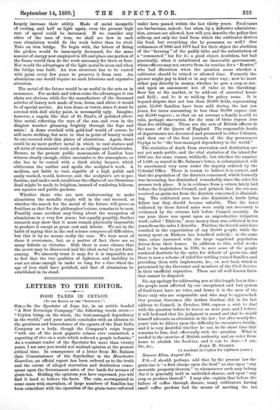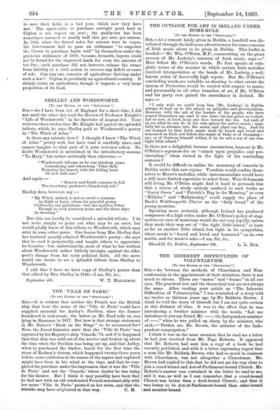LETTERS TO THE EDITOR.
FOOD TAXES IN CEYLON.
I To THE EDITOR OF THE "EPECTLTOR."1 Sin,—In the Spectator of June 1st, in an article headed "A New Sovereign Company," the following words occur,— "Ceylon being, on the whole, the best-managed dependency in the world;" and your article concludes with an allusion to the greatness and benevolence of the agents of the East India Company as a body, though the Company's reign began -" with one of the most gigantic crimes ever committed, a regrating of rice on a scale which reduced a people to famine." As •a constant reader of the Spectator for more than twenty years, I am sure you would not mislead opinion at the present critical time. In consequence of a letter from Mr. Salmon .(late Commissioner of the Seychelles) in the Manchester Guardian, an official report has been ordered as to the truth and the extent of alleged starvation and destitution conse- quent upon the Government sales of rice lands for arrears of grain-tax. Holding the opinions you have expressed, you will find it hard to believe the facts. The rain, accompanied in .some cases with starvation, of large numbers of families has been coincident with the operation of the grain-taxes enforced
under laws passed within the last thirty years. Food-taxes are barbarisms, indeed ; but when, by a defective administra- tion, arrears are allowed, how will you describe the policy that sells-up, not only the land from which the cultivator derives his food, but everything else he possesses as well P Our ordinances of 1866 and 1878 had for their object the abolition of the "farming" of the paddy tithe and the substitution of a " commuted " tax for it; a good object, doubtless, but bad practically, when it substituted an inexorable government, whose officers may not swerve from its routine, for a " Renter," who had discretion when the question arose whether a cultivator should be ruined or allowed time. Formerly the grower might pay in kind or in any other way ; now he must either pay directly in money, whether he gets a crop or not, and upon an assessment not of value at the threshing- floor but at the market, or be sold-out of ancestral house and field ; and he is so sold-up for paltry sums. It is beyond dispute that not less than 20,000 fields, representing quite 15,000 families, have been sold during the last ten years, for taxes amounting to less than 30,000 rupees (but say 45,000 rupees) ; so that on an average a family is sold to rain, perhaps starvation, for the sum of three rupees (less than five shillings). These are the acts of British officers in the name of the Queen of England. The responsible heads of departments are decorated and promoted to other Colonies, and then one of the first journals of the day pronounces Ceylon to be " the best-managed dependency in the world."
The statistics of death from starvation and destitution are not yet made public, and the vital statistics of the island for 1888 are, for some reason, withheld ; but whether the number of 1,048, as stated in Mr. Salmon's letter, is substantiated, will be ascertained very soon under the inquiry ordered by the Colonial Office. There is reason to believe it is correct, and that the population of the districts concerned, which formerly
was increasing, has diminished remarkably since the sales for arrears took place. It is in evidence from a return lately laid before the Legislative Council, and printed, that the revenue received as grain-tax from the districts concerned is diminish- ing. The cultivated area has also diminished, lands lying fallow lest they should become saleable. That the taxes collected by these forced sales were really not necessary is evidenced by the returns laid before Council recently. In one year there was spent upon an unproductive irrigation work, called " Elahera," more money than was collected in ten years from the sales I describe. Further, the forced sales have resulted in the expatriation of say 30,000 people, while the money spent on Elahera has benefited nobody ; at the same time, crime increased with the large vagabond population driven from their homes. In addition to this, relief works had to be undertaken in 1886, to save some of the people rendered destitute by the sales for default of grain-tax, and
_there is now a scheme of relief for settling ruined families and providing them with implements, &c., on new land, which is patronised by the Governor and members of the Civil Service in their unofficial capacities. These are all well-known facts that cannot be disputed.
Sir, my apology for addressing you at this length lies in this : the people most affected by our exceptional and bad system of food-taxes have no voice, and hence it is the men of the State only who are responsible and who may be approached. Our present Governor (Sir Arthur Gordon) did, in his last address to Council, in October, 1888, express a wish to deal with the question before he leaves us next year, and I believe it will be found that his judgment is sound and that be would himself advocate an alteration in the law ; but after nearly five years' rule he dilates upon the difficulty he encounters locally, and it is very doubtful whether he can, in the short time that remains to him, deal effectually with the question. What is needed is the exercise of British authority, and an order from home to abolish the food-tax, and it can be done.—I am,
P.S.—I should, perhaps, add that by the present law the grain-tax is " a first charge upon the land," as also upon " any moveable property thereon," to whomsoever such may belong (for it is generally held in undivided shares), and upon " any orop or produce thereof." I may also explain that before the failure of coffee through disease, many cultivators having small coffee gardens had the means of meeting the tat
to save their fields in a bad year, which now they have not. The upset-value to purchase outright good land in Ceylon is ten rupees an acre ; the paddy-tax has been sometimes assessed at nearly half this per acre per annum. In 1884, when the forced sales for arrears were in vogue, the Government had to pass an ordinance "to empower the Crown to purchase lands sold " by themselves under the grain-tax ordinance of 1878, because, forsooth, buyers could not be found for the improved lands for even the amount of tax due ; such purchase did not, however, release the owner from liability to a civil action to recover any deficit or costs of sale. Can any one conceive of agriculture thriving under such a law ? Ceylon is peculiarly an agricultural country. It simply exists on agriculture, though it imports a very large propdrtion of its food.



































 Previous page
Previous page